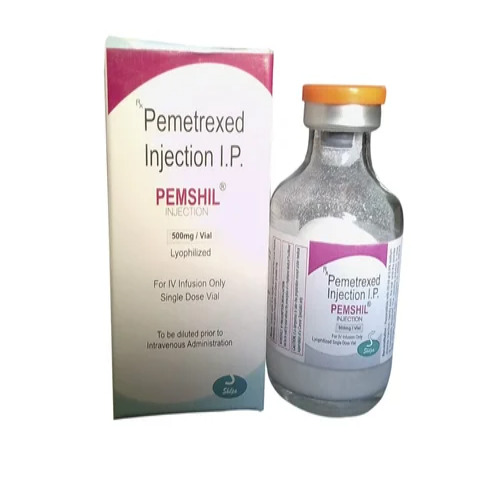Product Introduction:
Pemshil is a lyophilized powder formulation of Pemetrexed disodium, an antimetabolite anticancer agent. It is used alone or in combination with other cytotoxic drugs like cisplatin for treating advanced stages of cancer. It is administered intravenously under specialist supervision in oncology settings.
Uses (Indications):
Pemshil (Pemetrexed) is used for the treatment of:
-
Malignant Pleural Mesothelioma – in combination with cisplatin
-
Non-Small Cell Lung Cancer (NSCLC) – particularly non-squamous histology
-
First-line treatment for advanced NSCLC (with cisplatin)
-
Maintenance therapy for NSCLC after initial response to platinum-based chemotherapy
-
Second-line monotherapy for patients who have failed prior chemotherapy
-
Investigational uses in cervical, bladder, head and neck, and pancreatic cancers
Storage Instructions:
-
Store unopened vials at 2°C to 8°C (refrigerated)
-
Protect from light, heat, and moisture
-
Once reconstituted, the solution should be used within 24 hours if refrigerated
-
Do not freeze the reconstituted solution
-
Keep out of reach of children and handle with cytotoxic precautions
How It Works (Mechanism of Action):
Pemetrexed inhibits multiple folate-dependent enzymes involved in DNA and RNA synthesis, such as:
-
Thymidylate Synthase (TS)
-
Dihydrofolate Reductase (DHFR)
-
Glycinamide Ribonucleotide Formyltransferase (GARFT)
By blocking these enzymes, Pemshil prevents cancer cells from producing the nucleotides required for replication, leading to cell cycle arrest and programmed cell death (apoptosis), particularly in fast-growing tumor cells.
Side Effects:
Common Side Effects:
-
Nausea and vomiting
-
Fatigue
-
Low white blood cell count (neutropenia)
-
Anemia and thrombocytopenia
-
Diarrhea or constipation
-
Rash and skin irritation
-
Loss of appetite
Severe Side Effects:
-
Bone marrow suppression – risk of serious infections or bleeding
-
Kidney toxicity – increased creatinine, renal insufficiency
-
Liver enzyme elevation
-
Interstitial lung disease or pneumonitis
-
Severe skin reactions – including Stevens-Johnson syndrome
-
Sepsis or febrile neutropenia requiring hospitalization
Dosage (Typical Recommended Dose):
-
Standard dose: 500 mg/m² IV infusion over 10 minutes on Day 1 of a 21-day cycle
-
Adjust dose based on renal function and hematologic status
-
Co-administered with cisplatin (75 mg/m²) on Day 1
-
Supplement with folic acid (350–1000 mcg daily) starting 7 days prior and continuing throughout treatment
-
Vitamin B12 (1000 mcg IM) every 9 weeks
-
Dexamethasone (4 mg BID) the day before, day of, and day after to prevent rash
Method of Administration:
-
Administered intravenously via a peripheral or central line
-
Infuse over 10 minutes after dilution in 100mL of 0.9% sodium chloride
-
Do not mix with dextrose solution
-
Must be prepared and administered by trained oncology professionals
-
Administer in hospital or infusion clinic settings
Precautions:
-
Do not use in patients with severe renal impairment (CrCl < 45 mL/min)
-
Regularly monitor CBC, renal function, liver enzymes
-
Folic acid and B12 supplementation is mandatory to reduce toxicity
-
Use effective contraception during and 6 months post-treatment
-
Avoid NSAIDs around the time of dosing, particularly in patients with mild to moderate kidney impairment
-
Not recommended during pregnancy and breastfeeding
Drug Interactions:
-
Nephrotoxic drugs (e.g., cisplatin, NSAIDs) – may increase renal toxicity
-
Live vaccines – increased risk of infection due to immunosuppression
-
Drugs affecting folate metabolism (e.g., methotrexate) – may amplify toxicity
-
Myelosuppressive agents – increased bone marrow suppression risk
-
Use caution with drugs affecting renal tubular secretion
Allergies (Warnings for Allergic Reactions):
-
Hypersensitivity reactions are rare but may occur – rash, fever, breathing difficulty
-
Anaphylaxis is a medical emergency and requires immediate discontinuation
-
Pre-treatment with dexamethasone reduces skin reaction risk
-
Avoid in patients with known hypersensitivity to Pemetrexed
Overdose Information:
-
Overdose can lead to severe myelosuppression, mucositis, and pancytopenia
-
There is no specific antidote
-
Treat with supportive care – blood transfusion, antibiotics, and hospitalization
-
Monitor renal and liver function intensively
-
Dialysis is not effective for clearing pemetrexed
Missed Dose Instructions:
-
As it is administered in a clinical setting, missed doses should be rescheduled by the healthcare provider
-
Never attempt to self-administer
-
Ensure blood parameters are stable before rescheduling
-
Contact your doctor immediately if a dose is missed
Additional Notes:
-
Effective only in non-squamous NSCLC – not indicated for squamous subtype
-
Regular imaging (CT scans) required to monitor treatment response
-
Always verify renal function and complete blood count before each dose
-
Avoid alcohol and nephrotoxic drugs during treatment
-
Patients should be educated to report signs of infection or unusual bleeding



